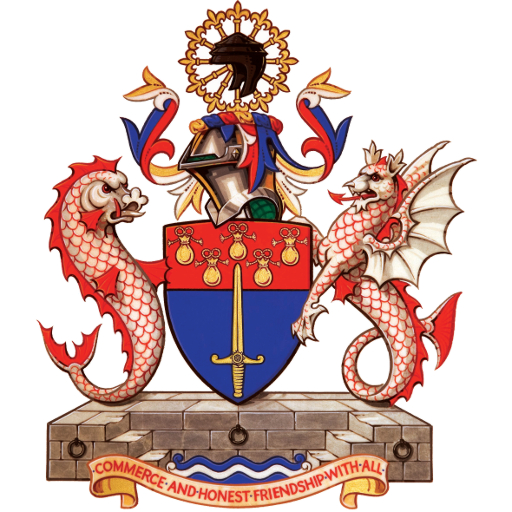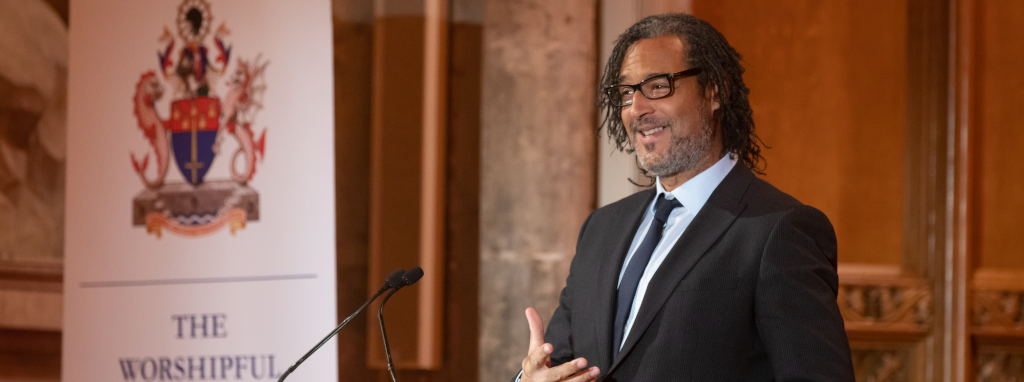Historian and broadcaster Prof David Olusoga OBE delivered the World Traders’ 35th Annual Tacitus Lecture, Finance and the City in and Age of Historical Reckoning, yesterday evening to 650 guests in London’s Guildhall.
The Tacitus Lecture is the largest lecture of its type in the City of London, bringing together the international business community, City livery companies, educators and students. Amongst the invited audience were pupils from schools supported by the Charitable Trust of the World Traders Livery Company.
Prof Olusoga’s passionate and enlightening lecture highlighted the pervasive influence that the Atlantic slave trade still has today on UK social behaviour two centuries after abolition.
Structured around the involvement in slavery of three figures within the City of London, Professor Olusoga examined how the wealth of these men was underpinned and generated on the backs of black Africans sold into slavery. Two were former Members of Parliament, Edward Colston (1636-1721) and Sir John Cass (1661-1718) who were closely involved in the management of the Royal African Company, the principle English slave trading company established under Charles II in 1660. The third was Alderman William Beckford (1709-1770), twice Lord Mayor of London in 1692 and 1669, whose grandfather was Governor of Jamaica, and who grew up to inherit 13 plantations covering 22,000 acres and ‘owned’ approximately 3,000 enslaved Africans.
The lecture began with a reminder of the notorious 1783 Zong case heard by Lord Mansfield in London, when mass murder onboard a slave ship was deemed acceptable grounds for an insurance claim, and whose abhorrent details recorded in an English court of law gave added impetus to the abolitionist movement.
Prof Olusoga highlighted his belief in the Age of Historical Reckoning, a current moment of cultural shift. Rather than seeing history as being erased, it was, in fact, being created, as hidden parts of Britain’s colonial past were rediscovered and brought to light through academic research and publication. In a generational awakening, young Britons were keen to reappraise their history – a subject Prof Olusoga stated was not a comfortable experience for many. Black history amounts to the ‘missing chapters’ in a shared British history.
He highlighted the many prominent investors, including several Lord Mayors and Samuel Pepys, who had sought to make money from the trade in enslaved Africans through the purchase of shares in the Royal African Company. Investment in Dutch engineering to move from cotton to sugar within the plantations in Barbados, a move supported by British investors, further increased demand for slaves. The records of a visit there in 1645 by Sir George Downing, whose street is now home to UK Prime Ministers, details the rapid returns on investment to be made from this industry built upon enslaved labour and the scale of slavery on this tiny island. Prof Olusoga explained how the capture of the much larger Jamaica in 1655 by the English brought about such a huge increase in British slave trading that the Royal African Company could no longer supply enough slaves for the demands of the island’s plantation owners, one third of them Scottish. Breaking the Company’s monopoly allowed traders in other British cities – Bristol, Glasgow and Liverpool – to profit from the African slave trade alongside London. The Royal African Company moved from controlling 97% of Atlantic slave trade in 1689 to 8% in 1701.
Covering the emotive subject of historical statues of these leading merchants whose wealth was gained from slavery, Prof Olusoga explained they were mute and even with contextual notes could not properly explain the brutality of the slave trade, whereas historical documents spoke volumes. Statues are not delivery systems for history. Yet the re-examining of history highlighted how the slow and toxic evolution of culture related to slavery persisted in the inequality that the slave trade has left behind. He quoted the 2019 European Social Survey which found that 81% of Britons today do not agree with the statement: “some races are born less intelligent than others”. Despite there being no scientific evidence for this statement, this means 19% of Britons do believe in the statement and therefore, that 1 in 5 people hold racist views. These people could be teachers, police officers or job interviewers. This is not unconscious bias, but conscious bias and evidence that ideas prevalent in 21st century Britain date from the 17th and 18th centuries.
Prof Olusoga highlighted the great work being done by academia and commercial companies who are genuine about diversity and inclusion. These are organisations who are keen to shift the dial by opening up their histories and confronting the legacies of the past, to reveal the whole truth and not just the white truth. Yet he also sought to separate the historic Atlantic slave trade from modern slavery. Until Abolition, the Atlantic slave trade was legal under English Common Law and supported and profited in by City of London merchants. He explained that the legalality of the slave trade made escape much harder and institutionalised the abuse. In the same way that the holocaust is not confused with other forms of genocide, he emphasised the need to separate this form of mass abuse from ‘modern slavery’ which is considered a crime by society and most governments across the world.
The lecture finished with questions and answers from the audience and Prof Olusoga explained how his zeal for writing children’s books was motivated by a desire to educate British children with an understanding of how 17th and 18th century British merchants obtained their wealth.
The Platinum Sponsors of this year’s Tacitus Lecture demonstrate the new inclusive approach to trade and education in the City.
Established by the London Chamber of Commerce and Industry, Platinum Sponsor the Black Business Association seeks to promote the role and place of Black owned businesses in London as a global city. As LCCI Chief Executive Richard Burge commented: “David Olusoga showed how the current consistent disadvantage suffered by Black business is a direct consequence of our city’s past. We have much to do in this age of historical reckoning for London”.
Also a Platinum Sponsor, Bayes Business School, an educational institution, is committed to open and respectful discussion of its history, having renamed itself in 2021 after Thomas Bayes rather than Sir John Cass. Bayes’ theorem suggests that we get closer to the truth by constantly updating our beliefs in proportion to the weight of new evidence. It was this idea – not only the person – that was the motivation behind adopting this name.
We would also like to thank our Bronze Sponsor, Alembic Strategy, which offers expert consulting from an ethical standpoint throughout the square mile and beyond.

